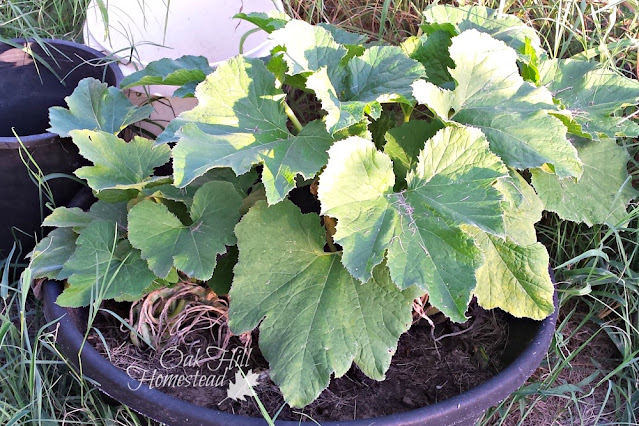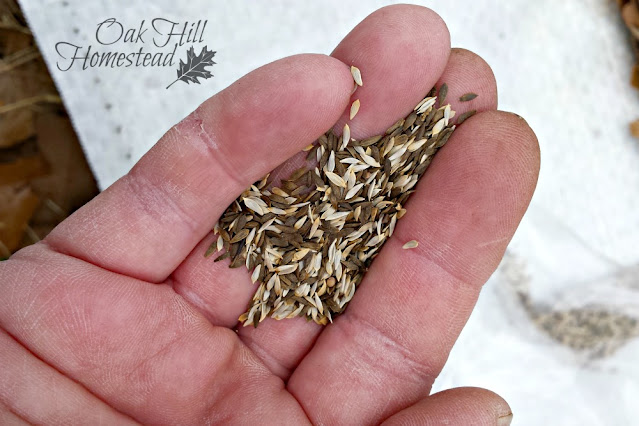Should you buy survival seeds? Let's look at the advantages and disadvantages.
Should you buy survival seeds for long-term seed storage?
Do you have a package of “survival seeds” stored in your refrigerator?
These pre-packaged collections of vegetable garden seeds have been getting a lot of attention lately. They’re marketed as a must-have for tough times, but are they really your best plan?
I do think a survival seed kit might be a good option, but perhaps it’s not the best option.
There are other plans that will help you be better prepared for whatever might come, from a personal crisis like a job loss, to food shortages and supply chain issues.
Listen on your favorite podcast player:
Apple Podcasts | Spotify | Episode Library
What is a survival seed kit?
You might have seen survival seed packages advertised online. There are many companies that offer them, from online seed companies to companies that sell emergency preparedness items and freeze-dried foods.
The premise is that you’ll keep these pre-packaged seed collections stored safely away until you need them. Then, after some sort of disaster or other, you can get them out of your refrigerator and start growing your family’s food.
A seed bank isn't a bad idea
Now I’m not discounting the possibility of a need for a cache of garden seeds, commonly called a seed bank.
Seed banks are places where seeds are kept safe to make sure we can grow these plants in the future, even if crops fail.
It's like having extra seeds just in case.
Although many seed banks are large facilities with huge amounts of all types of seeds, many libraries across the country maintain their own seed banks, and you can have your own personal seed bank too.
I do think you should have a personal seed bank that contains the seeds that you plant each year. I agree that having a package of survival seeds in your refrigerator can be a hedge against seed shortages, but I also think it’s good to have packets of your favorite seed varieties too.
Our parents and grandparents lived through the Great Depression and relied heavily on homegrown food to make ends meet and to keep their families fed. They needed seed security, and they had their own personal seed banks.
During WWI and WWII, Victory Gardens flourished in American backyards to support the war effort and to help avoid food rationing. Homegrown food kept families fed.
Those were real emergencies - and there will be emergencies again. Whether it’s a national or a personal crisis, homegrown food will save you money and supplement your diet.
I’m all for it - and I agree with the idea of having seeds in reserve, your own personal seed bank.
But I think we should be growing food now and not waiting for an emergency.
Survival seed kit advantages and disadvantages
Survival seed kits do have some advantages:
- they're conveniently packaged for you,
- they contain a variety of vegetable seeds,
- and are often already packaged in mylar bags for long-term storage.
But there are some disadvantages too. For instance,
- Those vegetables may not grow well in your area.
- Your family might not like all of the vegetables included.
- And seed viability decreases over time, even with proper storage.
How long do seeds last?
Most companies that sell survival seed kits advertise them as having a long shelf life.
Viability literally means “the ability to survive.” Seeds have a lifespan, during which they will germinate and grow, but over time all seeds lose some of that ability and energy, no matter how well they’re stored.
Eventually, seeds die, and they lose that energy that allows them to grow.
Storing your seeds properly in a cool, dark place can double their lifespan. One survival seed company recommends freezing your package of survival seeds, which might extend their shelf-life to as much as 15-25 years if they are frozen properly.
.
The best way to store seeds
The shelf life of seeds can be extended by storing them properly, but eventually those seeds’ germination rate will be reduced to the point that they won’t grow well or even at all.
To protect your seeds’ viability, whether you have a survival seed package or you’re storing seeds that are left over from last year, store them in a cool, dark place, away from moisture and light, and safe from rodents.
The back of the bottom shelf of your refrigerator is an ideal place, if you have enough room. Avoid storing your seeds in the refrigerator door or the crisper drawer, where the temperature and humidity are more likely to fluctuate.
Storing seeds purposefully is important, no matter how long you intend to store seeds, even if you’re just storing leftover spring seeds to plant in your fall garden.
However, seeds for each species of vegetable - tomatoes, peppers, lettuce, etc - have their own lifespan.
Some seeds have a shorter lifespan than others. Okra, corn and onion seeds are among those with shorter viability. Peas, beans and carrot seeds last a bit longer, and seeds with the highest vigor and the longest shelf life include cucumbers, melons and tomatoes.
So the longer you store seeds, even in the best of conditions, their germination rates will lessen and eventually, those seeds will lose their viability and they won’t sprout at all.
How can you tell if your seeds are viable? You can perform a germination test - find out how in this post.
Why you should be gardening now
My recommendation is that you don’t wait for a crisis or an emergency to begin gardening. Instead, start now.
It isn’t as easy as throwing seeds in the ground and harvesting bushels of produce in a few months
Gardening takes time - time to learn what each type of vegetable plant needs, when to plant them, and how to deal with insects and even 4-legged pests like rabbits and deer.
Start small so you won’t feel overwhelmed, and grow a little more each year as you gain experience.
Plus building healthy soil takes time. We’ve moved many times, and I know from experience that the success of a first-year garden can be disappointing.
You need time to build up the health of that soil by adding compost and other organic matter, and by fixing any mineral deficiencies and pH imbalances in your soil.
Building a garden infrastructure also takes time and effort.
Even if you plan to garden in the ground (which is the cheapest of all methods), you’ll need to till the soil and build up its health unless you happen to live in a good, fertile area.
If you plan to plant in containers, you’ll need to gather the containers, plus the soil to go in them. If you plan to use raised beds, they’ll need to be built and filled.
I use raised beds because of the Bermuda grass that grows so well here in the South. I tried for years to garden in the ground, and every year the same thing happened, the Bermuda grass took over and choked out my plants by the middle of summer. No amount of weeding helped to keep it under control.
Raised beds give me more control over the Bermuda grass, although I still have to stay on top of the grass that climbs up into the beds.
Instead of starting a garden during a crisis, when you really need to be successful, planting a garden now will let you ease into things.
By starting small, you can spread the cost of the infrastructure over a period of time. You can start with foods that you know your family will eat, and learn how to grow those plants successfully before branching out into other types of veggies.
You’ll learn what grows well in your climate and what doesn’t, and every year you’ll build up your soil’s health.
What you should grow in your garden
For instance, after many failed attempts, I’ve finally learned how to get carrot seeds to germinate, and I’ve amended my soil so that they produce long, straight carrots instead of stubby little ones with many legs.
Okra grows really well here, but our family dislikes okra, so I don’t waste space on it. And I’ve given up growing summer squash because of the inevitable battle against squash bugs and vine borers.
Your garden will probably look completely different from mine, depending on where you live and your family’s tastes, and a couple of gardening seasons will help you refine your own garden plan.
You might even decide that some vegetables are just too fussy to bother growing. (Maybe, like me, you’ll just give up on growing squash!)
Why you should save seeds
Gardening now is also the best way to get around the problem of seed viability and shelf-life.
When you save seeds from this year’s garden to plant in next year’s garden, the issue of seed viability is no longer an issue at all.
Seed saving is another hobby that takes some learning, but some seeds are super easy to save. Melons, tomatoes, peppers, radishes, peas, beans and others are a great place to start.
If you've been gardening for any amount of time, you probably have a few extra packets of seeds already stored away: an open packet of lettuce seeds from this year’s garden, some tomato seeds because you like to grow just a couple of plants of several varieties, and a packet of seeds that you couldn’t resist buying and you plan to plant next year.
These seeds will be viable for several years, and while you’re growing those, you can be learning how to save your own seeds to replace them.
Grow heirloom seeds
You should plant heirloom varieties if you plan to save seeds.
Heirloom vegetable seeds will grow true-to-type and consistently produce the same plants every year, unlike hybrid seeds which can produce “throwbacks,” vegetables that resemble their distant ancestors more than the plants you grew last year.
You can read more about these differences between heirloom and hybrid tomato plants here, but it applies to all vegetables, not just tomatoes.
Seeds from a hybrid variety may not produce the same kind of tomato that you saved the seeds from.
Seed packets are clearly marked with this information, whether the variety is a hybrid or an heirloom.
.
Can you jump in and start gardening at a moment's notice?
And how about these possible situations:
If a crisis happens in August, or in November, it’s too late in the year to start a garden. But if you already have a garden, you’ll simply harvest your food when it’s ready.
You might already have potatoes stashed away from this year’s harvest, or you might have frozen your abundance of peppers.
A job loss might mean you wouldn’t have enough money to start a new garden - but if you already have a garden in place, that’s not a problem.
Instead, by gardening now, you’ll be able to simply continue living life, growing healthy, organic food in your backyard garden that will help to feed your family, no matter what happens. Food that grows well in your climate and in your own garden. Food that your family likes, and that you know how to grow, how to prepare and even how to preserve.
Conclusion
In conclusion, I encourage you to start gardening now, even if you already have a package of survival seeds stored away.
Start small so you won’t be overwhelmed.
Learn which vegetables grow well in your garden, and build good soil over time.
Focus on heirloom varieties and save their seeds, so you’ll always have viable seeds.
Experiment with different gardening techniques and find what works best for you.
Related posts:
Why You Should Garden with Heirloom Seeds
How to Save Tomato Seeds
Vegetables You Can Grow in Containers
Facebook | Pinterest | Instagram | Subscribe






.jpg)














